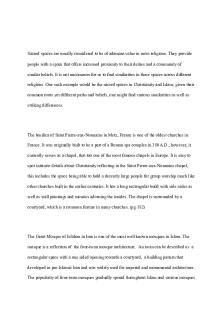Ministry of the Mushroom: Psilocybin Churches, Psychedelic Experience and Sacred Sensemaking PDF

| Title | Ministry of the Mushroom: Psilocybin Churches, Psychedelic Experience and Sacred Sensemaking |
|---|---|
| Author | Anna Lutkajtis |
| Pages | 1 |
| File Size | 427.1 KB |
| File Type | |
| Total Downloads | 366 |
| Total Views | 651 |
Summary
Anna Lutkajtis, The University of Sydney. Forthcoming in International Journal for the Study of New Religions, 2022. Ministry of the Mushroom: Psilocybin Churches, Psychedelic Experience and Sacred Sensemaking Abstract Recently there has been a surge of renewed interest in the psychedelic compound p...
Description
Anna Lutkajtis, The University of Sydney. Forthcoming in International Journal for the Study of New Religions, 2022.
Ministry of the Mushroom: Psilocybin Churches, Psychedelic Experience and Sacred Sensemaking Abstract Recently there has been a surge of renewed interest in the psychedelic compound psilocybin. In particular, psilocybin is being studied in clinical settings as a potential breakthrough treatment for depression. Alongside this growing therapeutic interest, there has been a rise in the religious use of psilocybin, as evidenced by the creation of a number of psilocybin mushroom churches in the United States. While the dominant popular discourse surrounding psilocybin is currently clinical, psilocybin churches offer an alternative form of meaning making regarding the psychedelic experience. Specifically, this article argues that psilocybin churches enable their followers to participate in a dynamic social process of sacred sensemaking, whereby psilocybin mushrooms are considered to be a sacrament, church members follow a ritual-based psychopharmacological practice, and the psychedelic experience is interpreted in terms of a direct encounter with the divine. Different psilocybin churches have unique approaches, ritual practices and cosmologies, nonetheless this article suggests that they may be united by this common process of ‘sacred sensemaking’. Introduction: The Rise of the Psilocybin Mushroom Church Throughout history, psychedelics, in the form of psychoactive plants and fungi, and more recently synthetic compounds, have inspired religious experience.1 Richard Evans Schultes et al. (2001) posit that the use of hallucinogenic plants has been part of human experience for many millennia. Similarly, Ronald K. Siegel (1977) argues that the religious use of psychedelics is a universal practice, to the extent that even non-human animals engage in drug-induced ‘religious behavior.’ Since the mid twentieth century, various researchers and intellectuals have proposed that psychedelic use might have been a foundational practice of many of the world’s religions and mystery traditions (e.g. Wasson, Hofmann and Ruck 2011 [1978]). For example, the amateur scholar and mycologist Robert Gordon Wasson (1898-1986) suggested that soma, the psychoactive plant described in the Rig Veda (c. 1200-900 BCE), may have been the fly agaric mushroom (Amanita muscaria). Similarly, John Marco Allegro (1923-1988), in his controversial book The Sacred Mushroom and the Cross, proposed that Jesus was not a historical figure, but rather a code that referred to the sacred effects of psychedelic mushrooms (Richards 2016). While these claims are highly speculative, there is solid evidence to suggest that psychedelics have featured in the spiritual practices of various civilizations throughout history (Partridge 2006). For instance, the discovery of dried peyote buttons in caves in Texas suggests that Native Americans have been ingesting the psychedelic compound mescaline since around 4000 BCE (Jay 2019). Additionally, Schultes et al. (2001) posit that a mushroom cult may have flourished in preColumbian times (circa 100 BCE to 300-400 CE) in northwestern Mexico. Further, references to sacred mushroom use have been found in the very earliest written codices produced in the Spanish New World; in these documents psilocybin-containing mushrooms have been referred to as teonanácatl, meaning “flesh of the gods” (Guzmán 2008: 405). For the purposes of this article, ‘religious experience’ is defined as a subjective experience which is interpreted within a religious framework and / or provides the foundations for a religious system (e.g. Connolly 2019). 1...
Similar Free PDFs

The Sacred Turtles of Kadavu
- 13 Pages

Churches and mosques
- 1 Pages

Philosophy of Ministry
- 4 Pages

ICA of Sacred Spaces
- 4 Pages

Cox v Ministry of Justice
- 5 Pages

Cassidy v Ministry of Health
- 1 Pages

the best Sport Experience
- 1 Pages
Popular Institutions
- Tinajero National High School - Annex
- Politeknik Caltex Riau
- Yokohama City University
- SGT University
- University of Al-Qadisiyah
- Divine Word College of Vigan
- Techniek College Rotterdam
- Universidade de Santiago
- Universiti Teknologi MARA Cawangan Johor Kampus Pasir Gudang
- Poltekkes Kemenkes Yogyakarta
- Baguio City National High School
- Colegio san marcos
- preparatoria uno
- Centro de Bachillerato Tecnológico Industrial y de Servicios No. 107
- Dalian Maritime University
- Quang Trung Secondary School
- Colegio Tecnológico en Informática
- Corporación Regional de Educación Superior
- Grupo CEDVA
- Dar Al Uloom University
- Centro de Estudios Preuniversitarios de la Universidad Nacional de Ingeniería
- 上智大学
- Aakash International School, Nuna Majara
- San Felipe Neri Catholic School
- Kang Chiao International School - New Taipei City
- Misamis Occidental National High School
- Institución Educativa Escuela Normal Juan Ladrilleros
- Kolehiyo ng Pantukan
- Batanes State College
- Instituto Continental
- Sekolah Menengah Kejuruan Kesehatan Kaltara (Tarakan)
- Colegio de La Inmaculada Concepcion - Cebu








